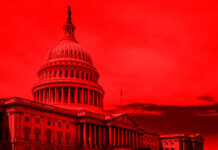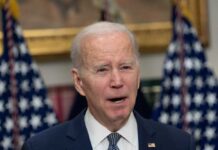
(Patriot.Buzz) – Signaling escalating concerns over the nation’s fiscal health, Moody’s Investors Service, a prominent credit rating agency, has revised its outlook on the United States government’s credit rating from stable to negative.
The revision is primarily attributed to the escalating risks surrounding the United States’ fiscal strength.
This includes challenges in managing government spending and generating revenue, particularly in the context of rising interest rates.
Moody’s expressed its anticipation of sustained substantial fiscal deficits in the U.S., which could significantly undermine the country’s debt affordability.
The agency stated, “In the context of higher interest rates, without effective fiscal policy measures to reduce government spending or increase revenues,” and added, “Moody’s expects that the U.S.’ fiscal deficits will remain very large, significantly weakening debt affordability.”
Additionally, Moody’s cited the ongoing political brinkmanship in Washington as a detrimental factor. The agency emphasized that the continuous political polarization within the U.S. Congress heightens the risk of an inability to formulate a consensus on a fiscal strategy that could mitigate the decline in debt affordability. “Continued political polarization within U.S. Congress raises the risk that successive governments will not be able to reach consensus on a fiscal plan to slow the decline in debt affordability,” said Moody’s.
Despite these challenges, Moody’s believes the U.S. will maintain its “exceptional economic strength.” The agency suggested that potential positive economic growth over the medium term could decelerate the deterioration in debt affordability.
Responding to Moody’s revision, Deputy Secretary of the Treasury Wally Adeyemo expressed disagreement with the negative outlook. “While the statement by Moody’s maintains the United States’ Aaa rating, we disagree with the shift to a negative outlook,” Adeyemo stated, affirming the strength of the U.S. economy and the status of Treasury securities.
This development comes as Congress grapples with the imminent threat of a government shutdown. The government is funded until November 17, but lawmakers are deadlocked over a new funding bill. Newly elected House Speaker Mike Johnson (R-LA) plans to unveil a Republican funding plan involving a laddered continuing resolution, or C.R., to fund different government sections through December 7 and January 19. However, this plan faces opposition from the White House and the Democratic-controlled Senate.
Similarly, Fitch Ratings downgraded the U.S. long-term foreign-currency issuer default rating in August, citing anticipated fiscal deterioration, governance erosion, and an increasing debt burden. Fitch also highlighted the impact of political disputes over the debt limit, noting that these recurring standoffs have undermined confidence in fiscal management.













